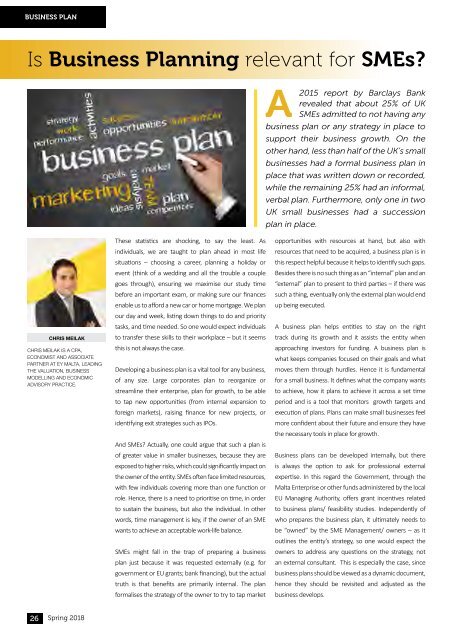ACCSPRING18_ONLINEVER
Create successful ePaper yourself
Turn your PDF publications into a flip-book with our unique Google optimized e-Paper software.
BUSINESS PLAN<br />
Is Business Planning relevant for SMEs?<br />
A<br />
2015 report by Barclays Bank<br />
revealed that about 25% of UK<br />
SMEs admitted to not having any<br />
business plan or any strategy in place to<br />
support their business growth. On the<br />
other hand, less than half of the UK’s small<br />
businesses had a formal business plan in<br />
place that was written down or recorded,<br />
while the remaining 25% had an informal,<br />
verbal plan. Furthermore, only one in two<br />
UK small businesses had a succession<br />
plan in place.<br />
CHRIS MEILAK<br />
CHRIS MEILAK IS A CPA,<br />
ECONOMIST AND ASSOCIATE<br />
PARTNER AT EY MALTA, LEADING<br />
THE VALUATION, BUSINESS<br />
MODELLING AND ECONOMIC<br />
ADVISORY PRACTICE.<br />
These statistics are shocking, to say the least. As<br />
individuals, we are taught to plan ahead in most life<br />
situations – choosing a career, planning a holiday or<br />
event (think of a wedding and all the trouble a couple<br />
goes through), ensuring we maximise our study time<br />
before an important exam, or making sure our finances<br />
enable us to afford a new car or home mortgage. We plan<br />
our day and week, listing down things to do and priority<br />
tasks, and time needed. So one would expect individuals<br />
to transfer these skills to their workplace – but it seems<br />
this is not always the case.<br />
Developing a business plan is a vital tool for any business,<br />
of any size. Large corporates plan to reorganize or<br />
streamline their enterprise, plan for growth, to be able<br />
to tap new opportunities (from internal expansion to<br />
foreign markets), raising finance for new projects, or<br />
identifying exit strategies such as IPOs.<br />
And SMEs? Actually, one could argue that such a plan is<br />
of greater value in smaller businesses, because they are<br />
exposed to higher risks, which could significantly impact on<br />
the owner of the entity. SMEs often face limited resources,<br />
with few individuals covering more than one function or<br />
role. Hence, there is a need to prioritise on time, in order<br />
to sustain the business, but also the individual. In other<br />
words, time management is key, if the owner of an SME<br />
wants to achieve an acceptable work-life balance.<br />
SMEs might fall in the trap of preparing a business<br />
plan just because it was requested externally (e.g. for<br />
government or EU grants; bank financing), but the actual<br />
truth is that benefits are primarily internal. The plan<br />
formalises the strategy of the owner to try to tap market<br />
opportunities with resources at hand, but also with<br />
resources that need to be acquired, a business plan is in<br />
this respect helpful because it helps to identify such gaps.<br />
Besides there is no such thing as an “internal” plan and an<br />
“external” plan to present to third parties – if there was<br />
such a thing, eventually only the external plan would end<br />
up being executed.<br />
A business plan helps entities to stay on the right<br />
track during its growth and it assists the entity when<br />
approaching investors for funding. A business plan is<br />
what keeps companies focused on their goals and what<br />
moves them through hurdles. Hence it is fundamental<br />
for a small business. It defines what the company wants<br />
to achieve, how it plans to achieve it across a set time<br />
period and is a tool that monitors growth targets and<br />
execution of plans. Plans can make small businesses feel<br />
more confident about their future and ensure they have<br />
the necessary tools in place for growth.<br />
Business plans can be developed internally, but there<br />
is always the option to ask for professional external<br />
expertise. In this regard the Government, through the<br />
Malta Enterprise or other funds administered by the local<br />
EU Managing Authority, offers grant incentives related<br />
to business plans/ feasibility studies. Independently of<br />
who prepares the business plan, it ultimately needs to<br />
be “owned” by the SME Management/ owners – as it<br />
outlines the entity’s strategy, so one would expect the<br />
owners to address any questions on the strategy, not<br />
an external consultant. This is especially the case, since<br />
business plans should be viewed as a dynamic document,<br />
hence they should be revisited and adjusted as the<br />
business develops.<br />
26 Spring 2018

















